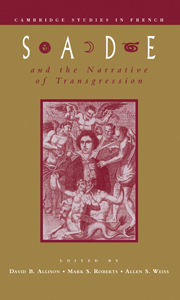Book contents
- Frontmatter
- Contents
- List of contributors
- Acknowledgments
- Introduction
- 1 The use value of D. A. F. Sade (An open letter to my current comrades)
- 2 Sade, or the philosopher–villain
- 3 Libidinal economy in Sade and Klossowski
- 4 A political minimalist
- 5 The Society of the Friends of Crime
- 6 Sade, mothers, and other women
- 7 The encyclopedia of excess
- 8 “Sex,” or, the misfortunes of literature
- 9 Structures of exchange, acts of transgression
- 10 Gender and narrative possibilities
- 11 Sade's literary space
- 12 Fantasizing Juliette
- Select bibliography
- Index
- Cambridge Studies in French
8 - “Sex,” or, the misfortunes of literature
Published online by Cambridge University Press: 21 August 2009
- Frontmatter
- Contents
- List of contributors
- Acknowledgments
- Introduction
- 1 The use value of D. A. F. Sade (An open letter to my current comrades)
- 2 Sade, or the philosopher–villain
- 3 Libidinal economy in Sade and Klossowski
- 4 A political minimalist
- 5 The Society of the Friends of Crime
- 6 Sade, mothers, and other women
- 7 The encyclopedia of excess
- 8 “Sex,” or, the misfortunes of literature
- 9 Structures of exchange, acts of transgression
- 10 Gender and narrative possibilities
- 11 Sade's literary space
- 12 Fantasizing Juliette
- Select bibliography
- Index
- Cambridge Studies in French
Summary
Le réel c'est l'impossible.
Jacques LacanL'impossible, c'est la littérature.
Georges Bataille“It is necessary,” wrote Baudelaire, “to keep coming back to Sade, again and again.” Baudelaire's injunction has been quite prophetic, since contemporary critics keep on returning to Sade in order to assess his contribution to modernity. D. A. F. de Sade's novelistic work has been interpreted by critics since Bataille as a literature of transgression. However, the limits which the Sadean text challenges are not those of sexuality alone. Rather, through his exhaustive exposition of sexuality Sade succeeds in expanding its meaning, not only to include perverse and even criminal modes of activity, but also to challenge all moral referents, and thus fundamentally to alter the very definition of the limits of thought.
As Michel Foucault suggests in his essay “A preface to transgression,” Sade's transgressive gesture posits through the language of sexuality an ontological and theological challenge regarding man's definition and relation to God:
From the moment that Sade delivered its first words and marked out, in a single discourse, the boundaries of what suddenly became its kingdom, the language of sexuality has lifted us into the night where God is absent, where all our actions are addressed to this absence in a profanation which at once identifies it, dissipates it, exhausts itself in it, and restores it to the empty purity of its transgression.
Sade's extensive exploration of the boundaries of sexuality is interpreted by Foucault as the prototype of all transgressive gestures, since it stages the challenge of the limits of philosophy and religion.
- Type
- Chapter
- Information
- Sade and the Narrative of Transgression , pp. 171 - 198Publisher: Cambridge University PressPrint publication year: 1995



